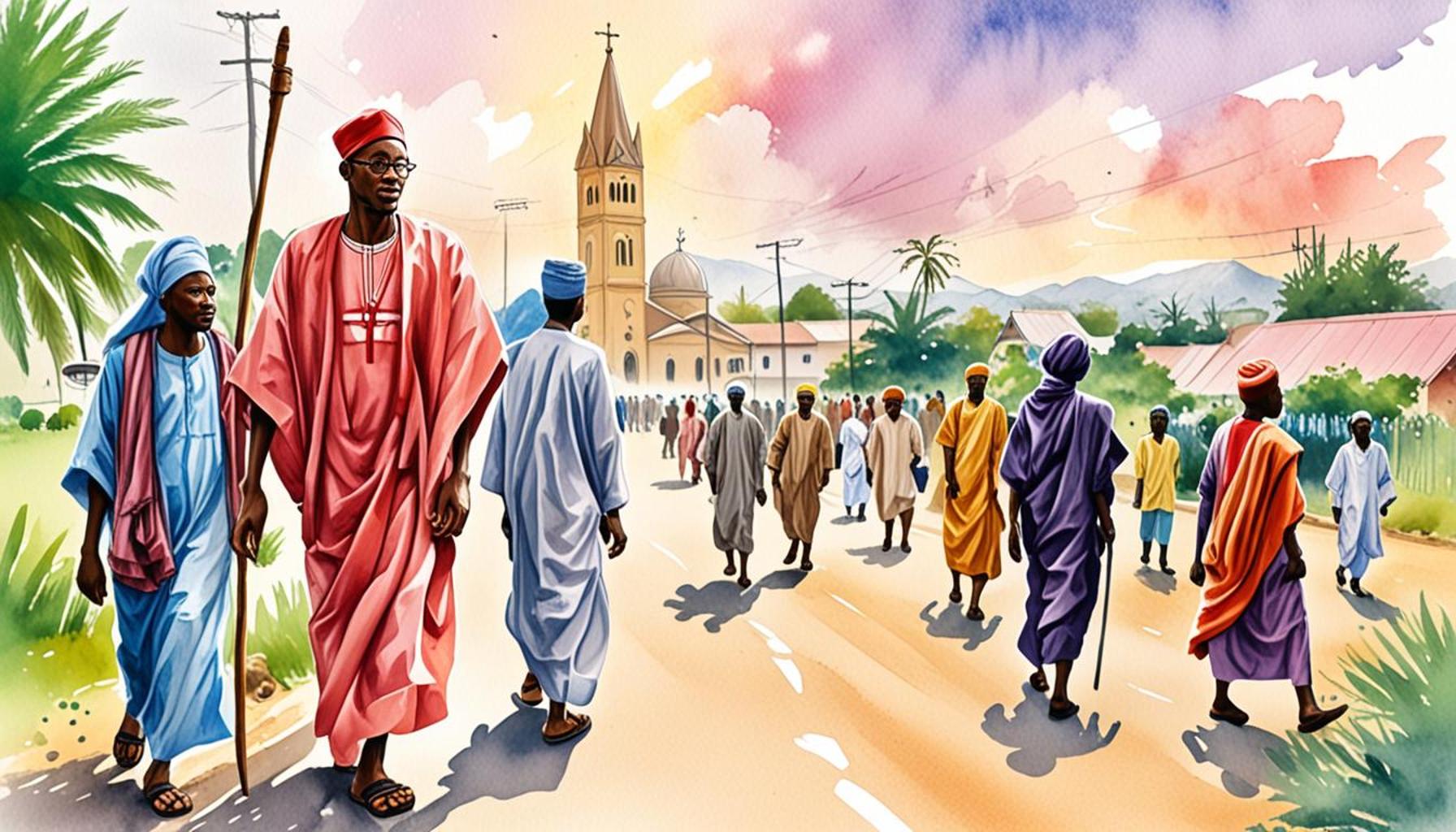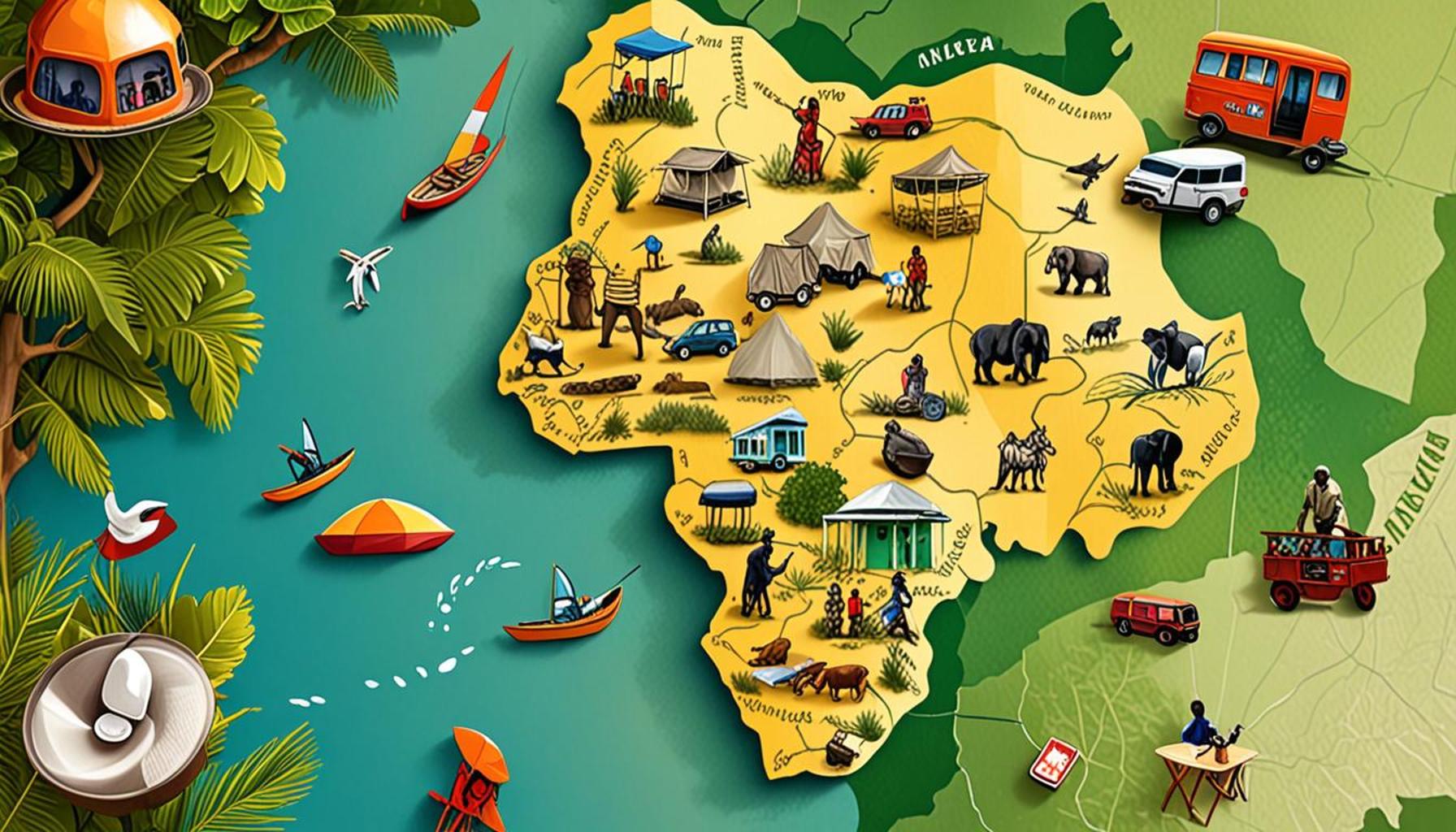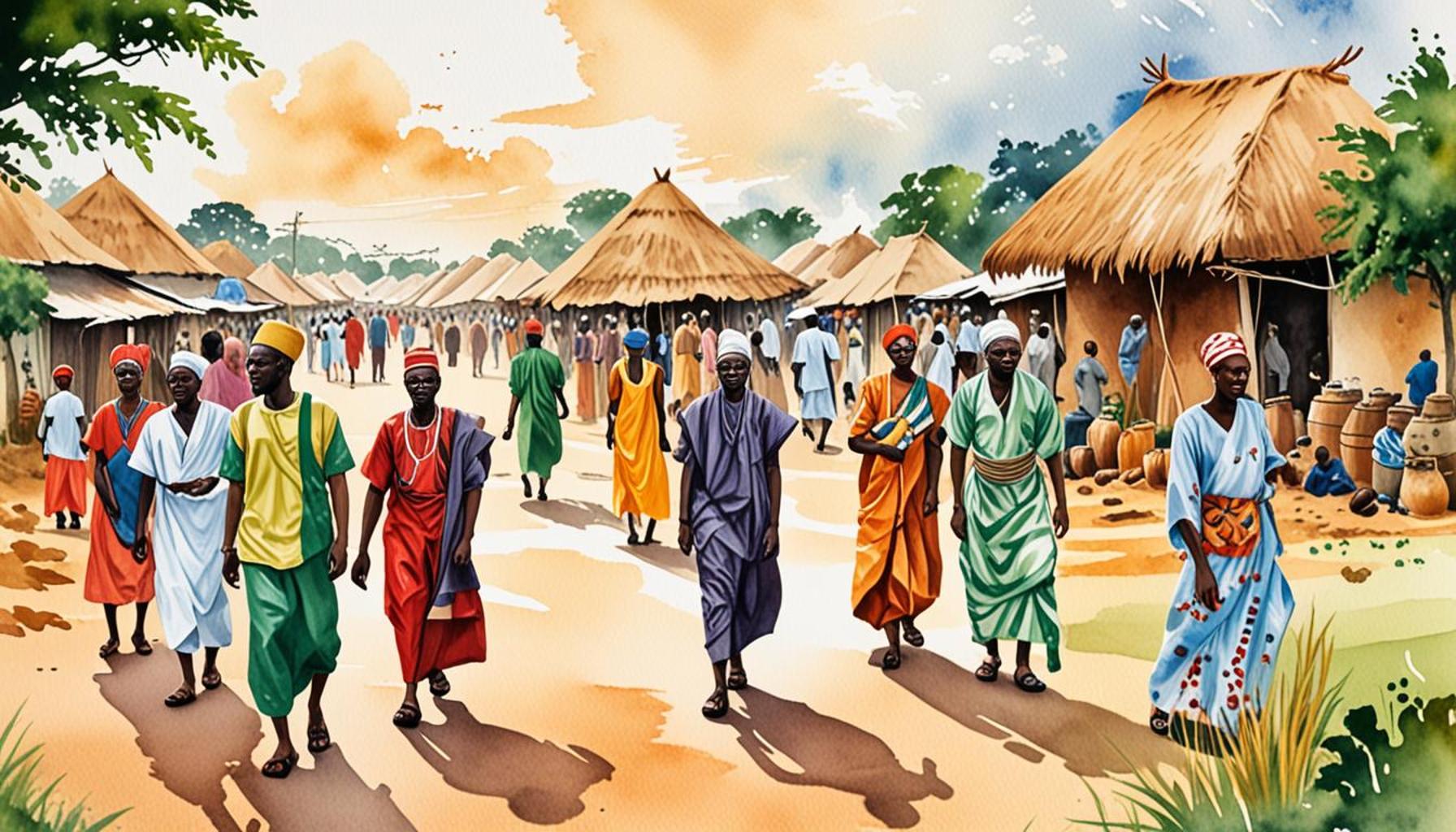Religious Routes: The Spiritual Paths Connecting the Faithful in Nigeria

The culture of Nigeria is a rich mosaic that reflects the country’s diverse heritage. With over 250 ethnic groups, each group brings its own set of traditions, languages, and beliefs, rendering the nation a unique spiritual landscape. In this setting, religious practices form an integral part of daily life, contributing to the collective identity of the populace. Each faith, from Christianity to Islam and Traditional African Religions, influences various aspects of society, from governance to social norms, providing an intricate understanding of Nigeria’s cultural dynamics.
Key Elements of Nigeria’s Religious Landscape
Nigeria’s religious composition is predominantly characterized by a blend of three main faiths:
- Christianity – With a considerable following, Christianity has deep roots in the southern and central regions of Nigeria. Cities like Lagos and Owerri are vibrant centers of Christian worship, hosting numerous denominations such as Catholicism, Anglicanism, and various Pentecostal movements. Regular church services, lively music, and community outreach activities showcase the religion’s significant role in shaping societal values.
- Islam – In the northern states, Islam is the dominant faith, with key cities including Kano and Sokoto. The rich traditions of Islamic practices, such as the observance of Ramadan and Friday prayers at the mosque, illustrate the deep spiritual commitment of the Muslim community. The annual pilgrimage to Mecca, or Hajj, is a significant aspect that many aspire to undertake, signifying faith’s importance in daily life.
- Traditional African Religions – Alongside the major world religions, indigenous beliefs continue to thrive throughout Nigeria. These religions often include the worship of ancestors and deities, which are practiced through rituals and festivals that connect practitioners to their cultural roots. Events like the Osun-Osogbo Festival celebrate the river goddess Osun, drawing participants from various regions and fostering communal bonds.
Highlighting the Spiritual Paths
The paths of religious expression in Nigeria extend far beyond mere observance; they shape community interactions and cultural preservation.
- An exploration of faith through rituals and festivals fosters a deeper understanding among practitioners. Events such as the Eid al-Fitr for Muslims and the Christmas festivities for Christians showcase a vibrancy that reinforces faith and encourages interfaith dialogues.
- A journey of unity and community emerges from shared spiritual experiences. Religious gatherings are moments of togetherness, providing support and strengthening relationships beyond family ties.
- A means to preserve cultural heritage is seen in how religious traditions influence music, dance, and arts, leading to a vivid expression of identity that resonates through generations. The intertwining of these elements reflects a broader narrative of what it means to be Nigerian.
As you explore the landscape of faith across Nigeria, you will uncover how these religious routes serve not only as pathways of devotion but also as crucial avenues for cultural exchange. They illuminate the tapestry of life that binds millions together in shared beliefs. Engaging with these traditions offers a chance to understand the essence of Nigeria’s spiritual heart, nurturing a sense of belonging that transcends individual faiths. Thus, exploring these fascinating journeys promises not just insights into spirituality but also an enriched appreciation for Nigeria’s diverse cultural history.
LEARN MORE: This related article may interest you
Unveiling the Tapestry of Faith
The spiritual pathways in Nigeria are not just routes of religious observance; they are profound connections that intertwine diverse communities and cultures. These religious routes serve as vital conduits, facilitating dialogue and understanding among various groups, enriching the spiritual and cultural fabric of the nation. As pilgrimages and festivals draw crowds, they transform into platforms where shared values resonate, creating bonds that transcend individual beliefs.
At the core of these routes lies the exploration of spirituality through rituals and celebrations. For instance, the Awakening of the Ancestors, a traditional rite observed by many African religious groups, emphasizes the reverence for forebears, blending storytelling, music, and dance into an immersive experience. This not only upholds the essence of ancestral worship but also acts as a reminder of cultural identity. Similarly, the vibrant celebrations of the Shan’bali Festival in Lagos, which honors the Yoruba deity of wealth, offer a platform for not just spiritual reflection but also community cohesion, drawing together participants from different backgrounds.
Shared Spiritual Journeys
Religious gatherings, ranging from church services in bustling Lagos to the call to prayer in the heart of Kano, evoke a sense of unity and togetherness. These moments become critical points of connection, where the faithful gather to reaffirm their beliefs and support one another. Such gatherings often extend beyond spiritual devotion; they foster relationships that contribute to a collective sense of belonging. In communities where social support systems may be lacking, religious congregations often bridge these gaps, offering practical assistance and a safe space for individuals to come together.
The intertwining of spirituality and cultural heritage is also robust in Nigeria, as seen through the influence of faith on the arts and traditions. Many religious festivals incorporate local music and dance, serving as reminders of the rich cultural narratives embedded within religious practices. For instance, the fusion of traditional drumming in Christian worship or Islamic spiritual gatherings highlights a creative interpretation of faith that resonates widely. This cultural synergy not only enriches the worship experience but also promotes an understanding of Nigeria’s multifaceted identity.
- Religious festivals like Eid al-Adha and Harvest Festivals encapsulate a spirit of gratitude, inviting participation from all walks of life, regardless of faith.
- Cultural expressions through dance and art during religious occasions reflect the themes of love, unity, and community service, boosting collective morale.
- The Hajj pilgrimage and local sacred journeys often inspire not just spiritual growth, but communal reflection, as families and friends prepare and participate together.
As we delve deeper into the religious routes shaping Nigeria’s social landscape, it becomes evident that these paths are vital not just to personal faith journeys but also to the broader notion of cultural identity and community. The interconnectedness of these spiritual practices not only promotes faith but also honors the rich heritage of Nigeria, creating a legacy that continues to thrive across generations.
| Advantages of Religious Routes | Description |
|---|---|
| Cultural Enrichment | Religious routes in Nigeria offer a vibrant perspective, showcasing unique local customs, traditions, and artistic expressions that connect the faithful to their heritage. |
| Community Building | These paths foster bonds among believers, encouraging interactions that lead to communal resilience, support, and a deeper sense of belonging within spiritual networks. |
The spiritual landscapes carved through Nigeria’s religious routes not only encourage personal faith journeys but also signify a growing movement towards community revitalization. Each step taken along these sacred paths enhances cultural awareness while bridging gaps between generational beliefs and modern ideologies. The intertwining of religion with daily life invites individuals to explore profound connections that transcend geographic and social divides.In addition, the role of these routes in promoting tourism is noteworthy. Pilgrims and curious travelers alike flock to these destinations, spurring economic growth and inviting local artisans and businesses to thrive. As visitors engage with traditional practices such as local festivals and rituals, the spiritual economy flourishes, solidifying the significance of these pathways in Nigeria’s cultural fabric. Indeed, these spiritual trails are more than mere paths; they are vital lifelines that enrich the faithful‘s experiences and underscore the importance of preserving Nigeria’s rich religious heritage. With continuing exploration and documentation, these routes hold the promise of connecting even more individuals to their historical faiths while promoting interfaith dialogue and understanding.
CHECK OUT: Click here to explore more
The Journey Towards Interfaith Harmony
As Nigeria navigates its complex socio-religious landscape, a surge in interfaith collaborations becomes apparent along these religious routes. Initiatives such as the Nigeria Interfaith Action Association (NIFAA) are fostering dialogue among different faiths, demonstrating that these spiritual avenues can serve not only as connectors for the faithful but as bridges for understanding among divergent beliefs. Events organized by NIFAA highlight joint prayers, community service, and cultural exchanges, reflecting a shared commitment to peace and mutual respect.
These interfaith gatherings often take place at significant religious sites, such as the National Mosque in Abuja, where Christians and Muslims converge for discussions aimed at dismantling prejudices and misconceptions. The transformative power of shared rituals—whether it is lighting candles for peace during the Christmas celebrations or participating in Ramadan iftars—offers profound opportunities for collaboration, emphasizing the universality of humanity. Such engagement showcases that these spiritual routes are not merely paths through which individuals seek divine connection, but also conduits for social reform and national unity.
The Impact of Pilgrimages on Spiritual Awakening
Across Nigeria, pilgrimages resonate deeply within the hearts of the faithful. These journeys often lead devotees to significant religious sites, such as the Olumirin Waterfall in Osun State, revered for its spiritual healing properties and connection to the Yoruba deities. Pilgrimages, whether to historical shrines or sacred mountains, foster a deep sense of renewal and purpose among practitioners. They are opportunities for reflection, reconciliation, and community bonding, where participants return home with not just spiritual enlightenment but also collective experiences that enrich their local communities.
The Hajj pilgrimage to Mecca remains a pinnacle for many Nigerian Muslims, incorporating not only the preparation process but also the reflections shared after returning home. Families come together, sharing stories of faith, struggle, and hope. The community aspect of this journey cultivates a deeper understanding of Islamic teachings and creates lasting connections with others who have shared similar experiences. Such shared journeys crystallize the concept of the ummah, further strengthening ties within local and global communities.
A Melody of Beliefs: The Role of Music
In Nigeria, music serves as a crucial element in religious practices, acting as a spiritual pathway that transcends linguistic and cultural barriers. From the rhythmic chants of Islamic call to prayer to the resounding choruses in vibrant church gatherings, music transforms these spiritual routes into celebratory experiences that invite participation. Festivals like the Calabar Festival showcase the rich diversity of Nigeria’s religious music, uniting various faith groups in a collective expression of spirituality and joy. This harmonious display not only captivates audiences but also reinforces a narrative of coexistence and respect.
The infusion of traditional instruments in religious music provides a unique platform for storytelling and cultural pride. Whether it’s the use of the talking drum during Christian worship or the Shekere in African Traditional ceremonies, such practices remind worshippers of their roots while echoing the shared journey toward faith. Music, in this context, becomes a powerful tool for expressing communal values, enhancing spirit and solidarity among the faithful.
- Joint community efforts reflect a growing recognition that different faiths share common values such as compassion, kindness, and service to others.
- Interfaith dialogues encourage the development of strategies to mitigate religious intolerance and foster peaceful coexistence among Nigeria’s diverse population.
- The momentum provided by shared cultural events aids in creating social cohesion, ensuring that religious routes are not just paths of personal spirituality but are also highways of communal engagement.
As these interconnected religious routes continue to thrive, they depict Nigeria as a tapestry of faith, where the journey itself becomes just as significant as the destination. Each pilgrimage and festival is a step toward a collective understanding, weaving together the myriad expressions of spirituality into a unified whole.
SEE ALSO: Click here to read another article
Conclusion: The Continuity of Faith and Unity
In conclusion, Nigeria’s myriad religious routes exemplify the profound spiritual journey undertaken by its faithful, showcasing a rich tapestry of beliefs and practices that not only define individual identities but also foster communal bonds. As pilgrims traverse sacred sites—from the spiritual heights of Olumirin Waterfall to the bustling gatherings at national festivals—their experiences offer a glimpse into the profound intersection of tradition and spirituality. These journeys encourage personal reflection while nurturing a collective commitment to peace and understanding among the diverse populace.
The emergence of robust interfaith collaborations further amplifies the significance of these spiritual paths. Through initiatives like the Nigeria Interfaith Action Association, there is a growing recognition that, irrespective of varying faiths, shared values of compassion and mutual respect can pave the way for a cohesive society. Music, as a vital conduit of expression, transcends barriers and unites worshippers, reinforcing the importance of cultural pride and collective heritage.
As these religious routes continue to evolve, they serve not merely as physical pathways leading to sacred spaces but as vital channels for fostering dialogue, understanding, and social reform in Nigeria. They remind us that spirituality is not an isolated journey but a shared experience that enriches communities and sustains the spirit of unity. In navigating these pathways, Nigerians are not just seekers of faith but architects of a harmonious society.


